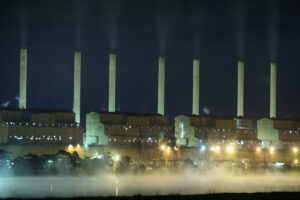15 per cent of Australia’s emissions come from sending fossil fuels overseas

The Australian government talks big on the world stage about how we need to end reliance on fossil fuels, but our exports don’t match our rhetoric.
Addressing the COP28 Ministerial Majlis, Climate and Energy Minister, Chris Bowen said “We need to end the use of fossil fuels in our energy systems. We can’t compromise on the science or the need to act. Words can be flexible, but we need outcomes. Fossil fuels have no ongoing role to play in our energy system. And I say this as the Climate and Energy Minister as one of the largest fossil fuel exporters in the world”
Yet as the Minister himself says, words can be flexible. While acknowledging Australia’s fossil fuel exports, it’s not clear if he’s referring to “our energy system” here in Australia or “our energy system globally”.
Words can be flexible, which is why actions are always a far better indicator. Given that the Australian government just passed legislation that will allow the Barossa gas project to go ahead, and how much effort the government has put into strenuously reassuring Japan that Australian gas companies will keep supplying it with gas well into the future, it doesn’t seem like the Minister is referring to the royal we in this instance.
The Australian Government cannot ignore the fact that the fossil fuels we’re sending to other countries’ energy systems make a big difference here in Australia.
The climate change they cause is felt here in Australia and the process of extracting that coal and gas from the ground also generates huge emissions in Australia.
Analysis of Australia’s emissions inventory combined with data from the ABS suggests that the process of extracting and shipping all the coal and gas Australia exports is responsible for an estimated 15% of Australia’s total emissions. That means that if Australia did not export such huge quantities of coal and gas then total emissions in Australia in 2021 could have been 15% lower.
Emissions in Australia from exporting coal and gas have grown rapidly since 2010, doubling its estimated share of total emissions from 7% in 2010. The strong growth was mainly caused by the rapid expansion in LNG exports over the same period, particularly since 2015.
Part of the reason emissions from extracting coal and gas from the ground are so high is because methane gas is released into the atmosphere when the mining industry drills for gas and digs for coal. And methane is exceptionally good at warming the atmosphere. Per tonne of emissions methane released from mining coal and gas are 28 times better at warming the atmosphere than a tonne of C02 emitted from burning the coal or gas.
The data and the science highlight the critical role that reducing Australia’s fossil fuel exports should play in not just reducing global emissions but also Australia’s domestic emissions.
Australia is a pro at saying the right thing at official talks like the COP, usually to distract everyone from the fact that back home it’s business as usual.
Between the Lines Newsletter
The biggest stories and the best analysis from the team at the Australia Institute, delivered to your inbox every fortnight.
You might also like
Climate target malpractice. Cooking the books and cooking the planet.
As the Albanese government prepares to announce Australia’s 2035 climate target, pressure is mounting to show greater ambition.
We need political courage, not caution | Polly Hemming
When it comes to solving the biggest national problems, a bit of courage leaves political caution for dead. Now’s not the time for politeness.
Nearly a fifth of Australia’s emissions now come from sending fossil fuels overseas
Australia’s exports of fossil fuels are not only increasing emissions across the world, they are also becoming a larger share of our domestic emissions.



